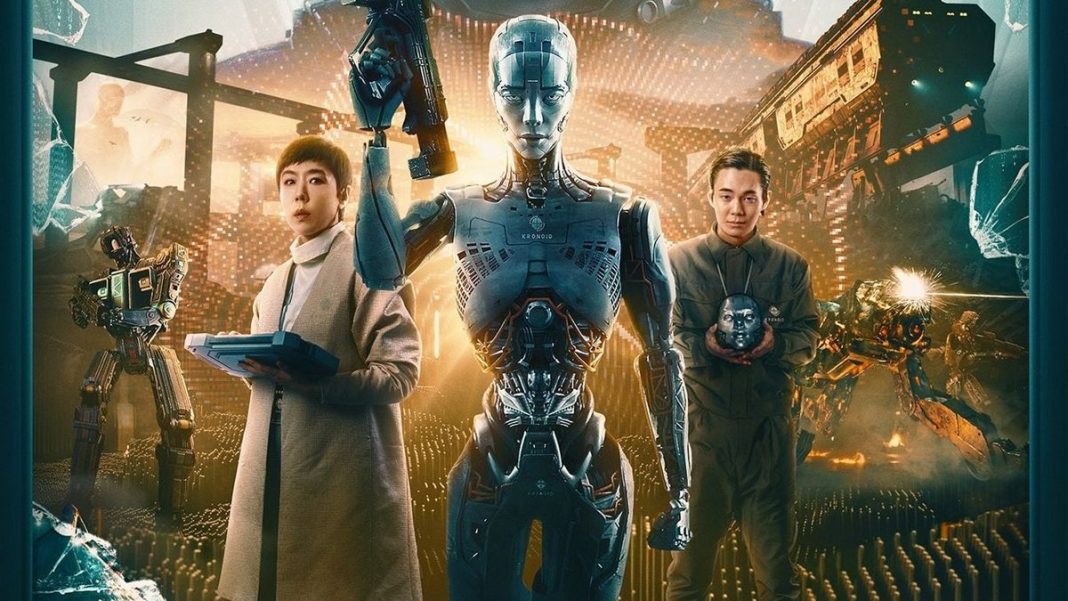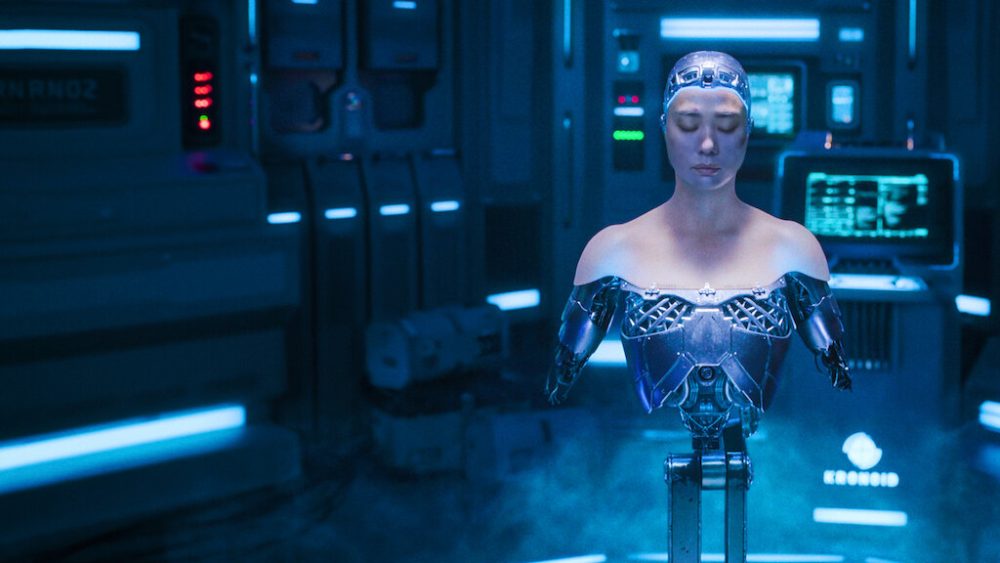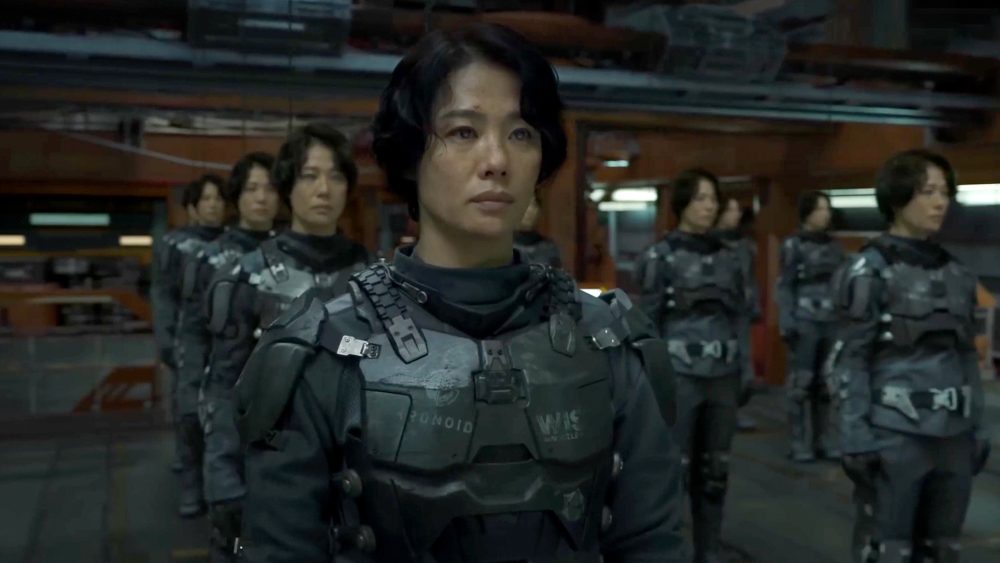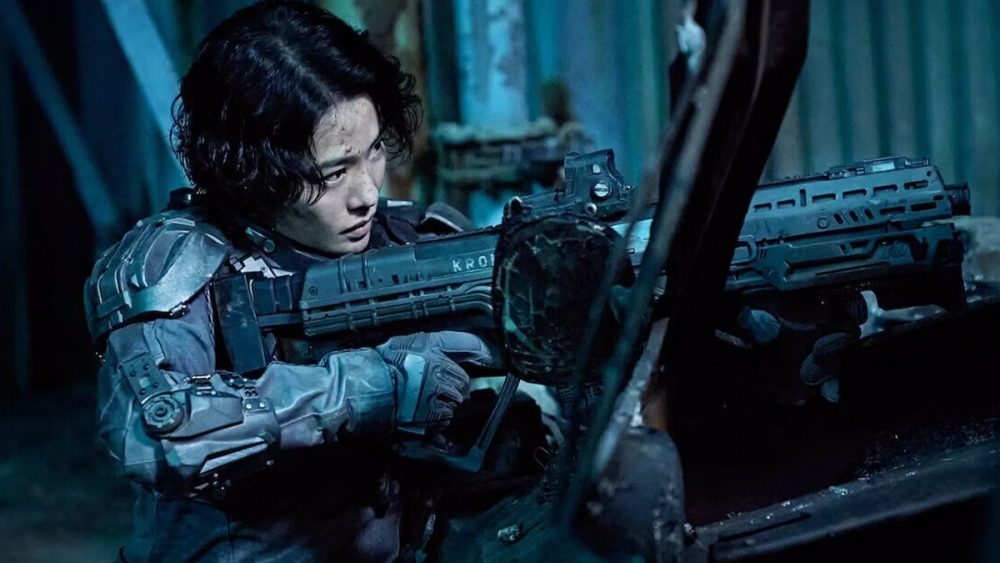Written by Gabriel Serrano Denis
Writing about genre films, for the most part, is an act of remembrance and acknowledgement. Films deserve to be discussed, reviewed, dissected, listed, etc, in an effort to keep them alive after they’ve had their time on the big or small screen. Even with a surmount of attention and reviews from respectable critics, some films get buried amongst the daunting amount of offerings from the streaming giants and franchise-peddling theaters. For independently financed genre films, the need to speak and spread the word is as much a necessity as the money being put in from advertisers and distributors. Some of these films receive the favor of critics and audiences early on and maintain the momentum until end of the year lists bump them back up. Others, even with promising starts, go to the bottom of the pile. Such is the case with a film that needed a much harder push upon its release and deserves to be brought to life again: high-concept action/sci-fi South Korean gem JUNG_E from director Yeon Sang-ho (Train To Busan). This is an attempt to get viewers’ eyes back on this film, and hopefully inspire others to continue the conversation for a rare film of bold action, pertinent themes, and a lot of heart.
JUNG_E takes place in a dystopian future where Earth has been decimated due to climate change. Humans live in man-made shelters, seeking refuge from the inhospitable environment. Similar to the original Mobile Suit Gundam anime, some of these shelters self-proclaim authority, naming themselves the Adrian Republic, and attack Earth along with the other shelters. Civil war ensues, and as the Adrian Republic gains power, the Allied Forces (formed by the remaining shelters) work towards delivering a strategic blow that could end the war. Captain Yun Jung-yi (Kim Hyun-Joo) leads the attack – a hero poised as the last hope for the Allied Forces – but ultimately fails the mission, which leads to a crushing blow to the Allied Forces’ offense. Several years later, the now comatose Yung-yi is the subject of experiments as AI research company Kronoid seeks to clone her brain to create robot soldiers for the endless war using her unique skills. Leading project JUNG_E is Yun Seo-hyun (Kang Soo-yeon in her final film role), daughter of Captain Jung-yi, terminally ill with lung cancer but determined to successfully map the captain’s combat skills for the perfect war machine while also seeking to reclaim and immortalize her mother’s honor.
As you can see, it’s a lot of setup and backstory, which could put off many viewers expecting the straightforward and direct narrative of Sang-ho’s Train To Busan films. However, after establishing the world we’re inhabiting, Sang-ho blows the doors down with one of the most memorable action sequences of the 2023. We are witness to Captain Jung-yi’s final encounter with the Adrian Republic, an all-out battle of the human captain versus robot warriors and mechs whose fluid choreography and long shots of uninterrupted firefights and melee combat showcases Korean cinema’s expertise in melding CGI with flesh and bone. It’s a scene that calls to mind the horrifying futuristic flash-forwards of war from James Cameron’s The Terminator franchise, while also showing Hollywood how it’s done. The scene ends in the inevitable failure of the captain, only to reveal that we’ve been watching Kronoid’s latest AI creation run a simulation, with JUNG_E failing just as her past organic self had. We then learn that this is only but the latest in a long run of simulations, Seo-hyun and her team failing again to crack through what made her mother fail in the first place. Without managing to successfully have the AI complete her mission, Kronoid’s research is under threat of being defunded.
Even though it begins with a massive action set-piece, JUNG_E is truly a film about ideas clashing with human emotion. This is not a grand film about the perils of AI or even its benefits. It’s about the ethics of constructing artificial consciousness for corporate gain and the dread of creating a mirror image of life. That conflict is present in major dramatic form as daughter Seo-hyun must cope with the fact that she has to see the ghost of her mother every day, and yet not have that recognition reciprocated. All this in the function of producing robot soldiers for the war machine. The bulk of the film deals in ethical and practical conversations on how to move forward with the JUNG_E project, and if it will even be possible to truly replicate the combat-efficacy of the war’s greatest warrior. However, a very important factor is introduced that further complicates and heightens the themes and ideas behind JUNG-E. We learn there is a class-system which dictates how a human’s consciousness may be used after one’s death. The 1% are able to acquire the rights to their consciousness and even transfer it to automated bodies, living eternally. The people on the lower rungs, given their capital, may be able to retain some of their rights, or must forfeit their mind’s data entirely for free use. It’s a masterful addition to an already humanly complex story as we realize that the character’s actions are not necessarily by choice, but merely by social circumstance. Seo-hyun’s mother herself entered the war to be able to pay for her daughter’s medical treatments as an infant, and once she landed in coma, became property of the government. It’s a unique take on the concept of AI that positions JUNG_E in the same realm as Ridley Scott’s Blade Runner for sheer complexity.
Throughout this review I’ve mentioned 3 classics of sci-fi action (The Terminator, Blade Runner, and Mobile Suit Gundam), and it is quite clear that JUNG_E takes inspiration from all of these as well as other films and media. And yet, I do not believe that is enough to call the film derivative, the reason being that JUNG_E has a very specific focus: the core relationship between mother and daughter, both casualties of war and a capitalist system. Seo-hyun and her mother are victims of circumstance, and in a world where the self can be sold wholesale, they are both attempting to regain some sort of humanity within the structures that stripped them of it. The end goal is not physical survival, but survival of the spirit, be that within or outside the machine. When Seo-hyun discovers that a possible treaty might end the war, and thus her work, she discovers that her mother’s consciousness may not be needed for the war any longer, but can continue to be used elsewhere. This is the last straw for Seo-hyun as she cannot bear to see her mother being exploited as a symbol or any other product. This sets into motion a climax that equals the opening action set-piece, a whirlwind battle where the unfinished JUNG_E AI fights for survival, and ends on one of the most bittersweet endings of 2023.
It’s bold and dangerous to kick off a film with such a striking showing of action only to delve into a character study of reckoning with how one will be remembered and how that information will be used. In focusing on a character hellbent on ensuring the ghost of her mother is respected and remembered for her success rather than her failures, Sang-ho brings into focus a rumination on AI rather than a takedown. His sights are on the corporations which will dictate how to control data and people rather than on the concept of AI itself. By crafting a human story by way of artificial intelligence, JUNG_E is the logical step forward to what Blade Runner established.
Rather than calling it derivative or cliched because it’s digging into the same pockets that other films like it did, there’s a strong argument to be made for JUNG_E as one of the boldest and incisive sci-fi films of recent years. In an age where franchises are staggering and the future of sci-fi is being put into the hands of franchise-builders rather than world-builders, Korean cinema and Sang-ho are betting on stories squarely focused on human emotion, the action spectacle an addition to the heart of the story.
JUNG_E debuted in first place on Netflix’s global top 10 when it was released back in January 2023, and reviews popped up here and there, some admiring its ideas and others calling them unoriginal. At the end of 2023, it was absent from every year-end listicle. It was a victim of being released early in the year and of a lack of wider media attention. Not that critics and viewers can’t have differing opinions, but it’s disheartening how Zack Snyder’s mediocre and clearly derivative Rebel Moon and Gareth Edward’s The Creator (which attempts to tell a emotional and humane story but comes up short with a simplistic take on AI that fails to challenge the tropes it borrows from) dominate the cultural conversation around sci-fi. There are many factors that lead to this, one of them being budget and both directors’ much-publicized roles in franchise films, but in the era of quick-consumption and Rotten Tomatoes’ hold on public opinion, it’s crucial to keep bringing the films that are squashed by the corporations back into the fold. Like JUNG_E herself, Sang-ho’s film is at the mercy of whoever deems it important – a product with more heart than every franchise film released in 2023 in search of an audience who will honor it. Hopefully, these words will inspire more people to seek out JUNG_E and, more importantly, write or talk about it.












Thank you for reminding me of this wonderful film! I watched it when it initially came out, rather enjoyed it and then promptly forgot about it! Doh! I might have to watch it again soon. Thanks for championing the underdogs!
Comments are closed.